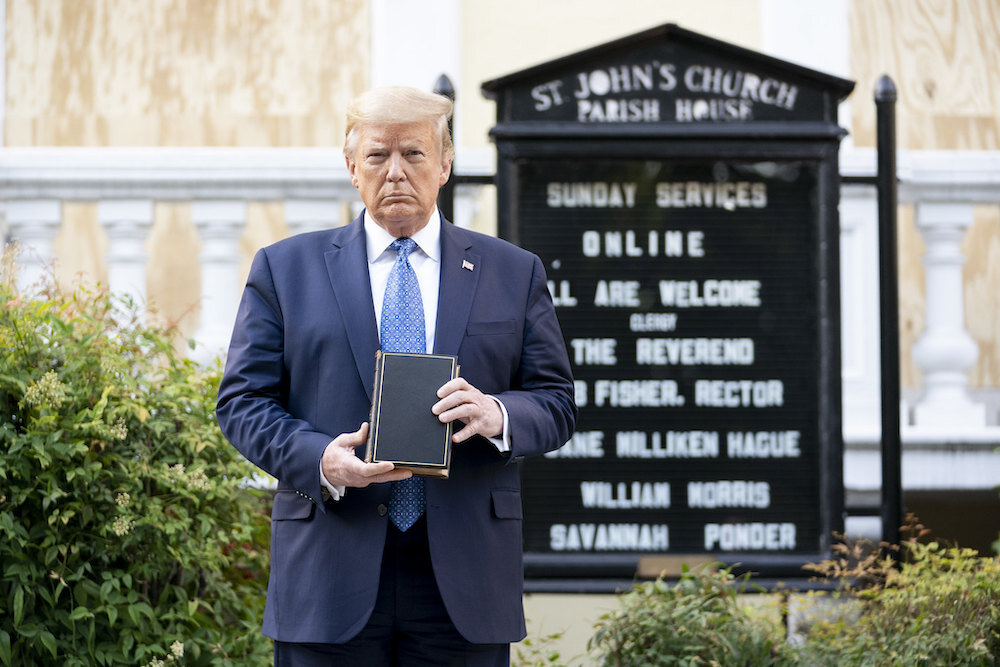Are Many ‘Evangelicals’ Who Support Trump Not Actually Evangelicals?
Religion Unplugged believes in a diversity of well-reasoned and well-researched opinions. This piece reflects the views of the author and does not necessarily represent those of Religion Unplugged, its staff and contributors.
President Donald Trump holds a Bible in front of St. John’s Episcopal Church, known as the Church of the Presidents. (Photo courtesy the White House)
(OPINION) Both as a minister and as someone who endeavors to write about how religion affects our lives and culture, I sometimes am asked to explain various religious phenomena.
Since 2016, in private conversations and in responses from newspaper readers, the question I’ve probably been asked more consistently than any other is: “How do you account for White evangelicals’ devotion to Donald Trump?”
I’m a lifelong evangelical — the son of a Southern Baptist minister turned Pentecostal, and for more than 40 years now a Pentecostal pastor myself.
So I’ve taken stabs at answering that question. But more often than not I’ve ended up shrugging and saying, “I don’t know. I don’t get it, either.”
Actually, I’ve tried not to talk or write about Trump anymore, pro or con, win or lose, because, a) I clearly don’t know what I’m talking about; b) I usually offend people without swaying them one iota and without them swaying me; and c) politics largely bores me.
However.
The Washington Post’s Shadi Hamid had a fascinating column the other day exploring how the former president has changed what it means to be an evangelical.
In addition to a being columnist for the Post and a member of its editorial board, Hamid is a research professor of Islamic studies at Fuller Seminary, a large and widely respected evangelical school. He holds a doctorate in political science from the University of Oxford.
He made several intriguing points I hadn’t thought of.
Here are my takeaways from his column:
— White evangelicals are the voters most loyal to Trump. Four out of five supported him in 2020. But initially, White evangelicals were skeptical of him. During the 2016 Republican primaries, “when one influential Christian magazine surveyed 100 evangelical leaders, not a single one said they planned to vote for Trump,” Hamid says.
— Migration to the Trump camp wasn’t immediate and seems to have been largely transactional at first. Trump became the Republican nominee; most White evangelicals were already Republicans, so they supported him. He promised them U.S. Supreme Court justices who would overturn Roe v. Wade — and followed through. He said he’d protect them from society’s accelerating secularization. All of this is old news, of course. Fresh to me was Hamid’s analysis of what’s happened since then:
— After evangelicals embraced Trump, they saw their ranks grow, even as other Christian denominations declined. From 2016 to 2020, evangelicals’ share of the White adult population increased from 25% to 29%, Hamid says.
— But much of this growth came from people who weren’t suddenly converts to the evangelical faith. Instead, they began to identify as evangelicals less because of their spiritual beliefs and more as a way of signaling support for Trump. Evangelicals came to be seen as pro-Trump stalwarts — so even people who weren’t evangelicals in any traditional understanding of that word started calling themselves evangelicals.
For instance, among White Trump supporters who were not evangelicals in 2016, 16% identified as evangelicals four years later, Hamid says.
— It’s become more common for people who identify as evangelicals to not attend church services — although evangelicals always have been sticklers for attendance.
“In 2008, only 16 percent of evangelicals said they never or seldom attended church,” Hamid says. “By 2020, 27 percent did.”
— Some of the numbers are truly startling. In one survey, 14% of Muslims, 12% of Hindus and 5% of Jews called themselves “born-again” or evangelical Christians. (The portion of these evangelicals who belong to other faiths are far higher among Republicans than Democrats.)
— Hamid suggests that these numbers make sense.
“In an America that is rapidly secularizing — in just two decades, church membership has plummeted to under 50 percent, from about 70 percent — partisan commitments are replacing religious affiliation as people’s overarching source of identity,” he says.
— None of this bodes well for the religious-political climate as the 2024 presidential election looms.
“It means we will see more intense political polarization around religion,” Hamid predicts. “Now that White evangelicals are so disproportionally and unapologetically Trump-supporting, the share of Democrats who view Christianity negatively is likely to remain high or perhaps even increase.”
That’s a strategic mistake, he thinks.
A key difference between Barack Obama’s successful presidential campaigns and Hillary Clinton’s losing one was that, in Hamid’s words, Obama “took seriously the task of reaching out to devout Christians and presenting (his) party as hospitable to people of faith. The Hillary Clinton campaign, on the other hand, made a conscious decision to de-prioritize outreach to evangelicals.”
Trump stepped into that void — “a perfectly imperfect vessel for an uncertain age,” he writes.
“Trump’s ability to turn out evangelicals, both religious and nonreligious — including the growing ranks of Muslim, Jewish and Hindu ‘evangelicals’ — to the same overwhelming degree that he did in 2020 could very well decide a close race. Religion matters, even when it’s not really about religion.”
Paul Prather has been a rural Pentecostal pastor in Kentucky for more than 40 years. Also a journalist, he was The Lexington Herald-Leader’s staff religion writer in the 1990s, before leaving to devote his full time to the ministry. He now writes a regular column about faith and religion for the Herald-Leader, where this column first appeared. Prather’s written four books. You can email him at pratpd@yahoo.com.

